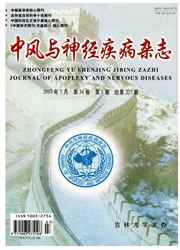

 中文摘要:
中文摘要:
目的 观察经皮三叉神经电刺激(TNS)处理对匹罗卡品诱发的癫痫大鼠的行为、海马区细胞因子IL-1β和TNF-α及小胶质细胞活化的影响,探讨经皮三叉神经电刺激对实验性癫痫的治疗作用及其可能炎性机制。方法 选择健康雄性大鼠,设正常对照组和实验组,实验组建立匹罗卡品癫痫持续状态模型6 h后,再分成单纯匹罗卡品模型组(pilo组)和经皮三叉神经电刺激组(TNS组),分别给予假刺激和电刺激4 w后,再次进行匹罗卡品致痫,观察大鼠癫痫行为,用酶联免疫吸附(Elisa)的方法检测大鼠海马组织IL-1β、TNF-α的蛋白含量,免疫组化的方法观察小胶质细胞活化情况。结果 (1)经皮三叉神经电刺激后再次匹罗卡品致痫TNS组大鼠较pilo组发作严重程度减轻,持续时间较短,死亡率降低(P〈0.05,P〈0.01);(2)TNS组大鼠海马IL-1β和TNF-α含量较pilo组显著降低(P〈0.05);(3)TNS组活性小胶质细胞的数量较pilo组在各时间点均明显减少(P〈0.05)。结论 在实验性癫痫中,经皮三叉神经电刺激有显著的抗癫痫作用,提高了癫痫发作的阈值,其机制可能与其下调炎性因子IL-1β和TNF-α及减轻小胶质细胞的活化有关。
 英文摘要:
英文摘要:
Objective To study the antiepileptic role of TNS and its possible inflammatory mechanism. The effect of transcutaneous trigeminal nerve stimulation(TNS) on the epileptic behavior, the expression of inflammatory cytokines and the activation of the microglial in the hippocampus of Pilocarpine-induced epileptic rats was observed Methods Male adult rats were randomly divided into control and experimental groups in which rats were injected with pilocarpine to induce status epilepticus[1] This experimental group rats were then re-divided into two subgroups:Pilo group( with sham TNS treatment) and TNS group(with TNS treatment for four weeks). Four weeks later, a second injection of pilocarpine was conducted to induce a seizure and the seizure severity, duration and mortality rate were recorded. ELISA and immunohistochemistry were employed to detect the concentration of interleukin-1 β (IL-1β )and tumor necrotic factor-α (TNF-α)and the activation of mi- crglia. Results Less severe attack and shorter duration of seizure and lower mordality rate were observed in pilocarpine re- injected rats with prior TNS treatment for four weeks after SE induction than that in pilocarpine re-injected rats without prior TNS treatment after SE induction(P 〈 0.05 ,P 〈 0.01 ). Lower concentration of IL-1β and TNF-α and fewer activated mi- croglia were detected at different timepoints after seizure in pilocarpine re-injected rats with prior TNS treatment for four weeks after SE induction than that in pilocarpine re-injected rats without prior TNS treatment after SE induction( P 〈0.05, P 〈 0.01 ). Conclusions TNS has significant antiepileptic effect with the elevated threshold for seizure attack in epileptic rats and this antiepileptic effect may be associated with its reduced response of inflammatory cytokine IL-1β and TNF-α and microglia.
 同期刊论文项目
同期刊论文项目
 同项目期刊论文
同项目期刊论文
 期刊信息
期刊信息
